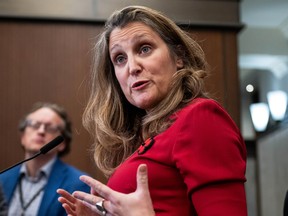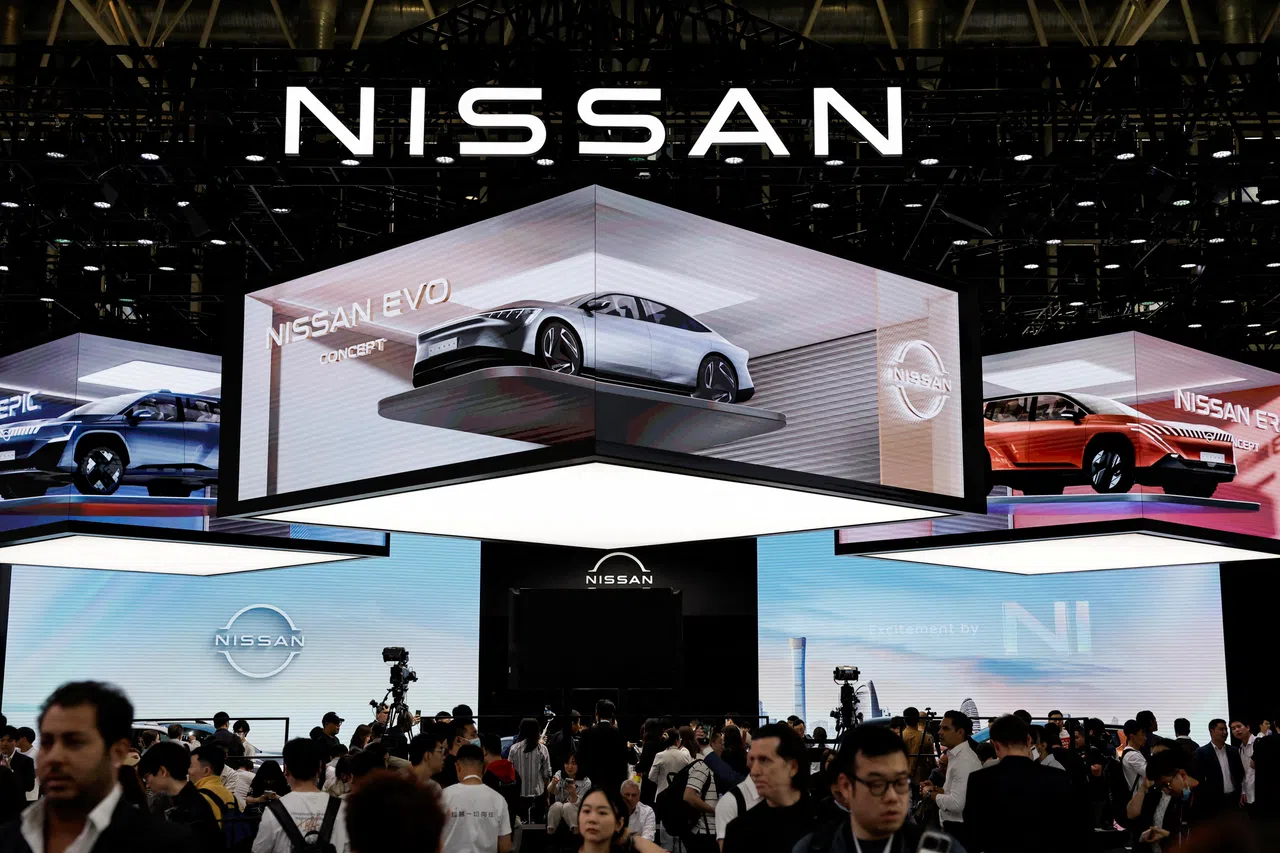Freeland says she is convinced that her government is in a better position than it was during Trump’s first mandate — pointing to the Canada-U.S.-Mexico free trade agreement
Article content
OTTAWA — Deputy Prime Minister and Finance Minister Chrystia Freeland thinks China could be the tie that binds the new Trump White House and the Liberal government.
Despite harsh words from President-elect Donald Trump’s closest allies toward Canada and Prime Minister Justin Trudeau in particular, Freeland says she remains undeterred in wanting to find common ground with the incoming U.S. administration.
Advertisement 2
Article content
Speaking after a Canada-U.S. cabinet committee meeting on Wednesday, she said the best way to collaborate with Trump 2.0 is to look for “win-win outcomes.”
“I think the position on China is one area of clearly shared views and shared approach between Canada and the United States,” she said, adding it was one of the subjects that Trump and Trudeau touched on during their conversation the day after the U.S. election.
Freeland says she is convinced that her government is in a better position than it was during Trump’s first mandate — pointing to the Canada-U.S.-Mexico free trade agreement negotiated by Trump and former trade representative Robert Lighthizer.
“That agreement means that Canada is on a better and stronger footing vis-à-vis the U.S. than we were with the first Trump administration,” she said.
Another significant difference, added Freeland, is that Canada has “toughened” its position on China since those negotiations, pointing to the recent tariffs of 100 per cent on Chinese electric vehicles and 25 per cent on Chinese steel and aluminum.
She described it as the “right thing to do” to counter China’s policies of EV overcapacity meant to flood other markets and undermine Canadian workers and industries.
Article content
Advertisement 3
Article content
“It also makes us the only country in the world which is fully aligned with the U.S. today when it comes to economic policy vis-à-vis China and that speaks to the fact that our fundamental economic interests are so aligned,” she said.
“We are very aligned with this U.S. administration on the issue of China, which is a central issue for them.”
Freeland has been spearheading the government’s efforts on Canada-U.S. relations since Trump’s win. She has met with leaders in the steel, automotive, energy and artificial intelligence sectors, and will be meeting with leaders in the nuclear sector Friday.
In a statement, Catherine Cobden, president and CEO of the Canadian Steel Producers Association, agreed that Canada is “not in the same place” as it was during the first Trump administration, which saw hefty tariffs imposed on Canadian steel and aluminum.
At the time, the Liberal government shot back with retaliatory tariffs on a wide range of U.S. products, such as bourbon, playing cards and licorice. The tariffs were lifted a year later.
“For one thing, we learned that the tariffs imposed by both countries were harmful on both sides of the border as a result of our highly integrated economies,” said Cobden.
Advertisement 4
Article content
Cobden added that Canada has “significantly advanced its trade policy tools to strongly align with the United States” with tariffs on Chinese imports, and she said her organization feels this situation represents “an opportunity for Canada to work with the United States.”
“That said, Canada must do the work to ensure the U.S. government recognizes these fundamental changes and that Canada continues to keep pace with our trade tools to combat ever-evolving practices of unfair steel traders,” she said.
But some of Trump’s top aides and close allies are no fans of Trudeau and his Liberal government and are openly hoping for Conservative Leader Pierre Poilievre to replace him.
Trump’s next national security adviser, Mike Waltz, has long criticized Trudeau’s stance on China and said in no uncertain terms Trudeau has to go.
In May, Waltz cheered on Poilievre on X, saying he is “going to send Trudeau packing in 2025 (finally) and start digging Canada out of the progressive mess it’s in.”
Stephen Miller, Trump’s deputy chief of staff for policy, called Canada “increasingly authoritarian and despotic” and called the prime minister “far-left Trudeau.”
Advertisement 5
Article content
And Tesla CEO Elon Musk, who has become one of Trump’s closest allies, wrote on X, which he owns, that the prime minister “will be gone in the upcoming election.”
Freeland said the criticism from Trump’s team comes as no surprise to her.
“The reality is that our government and indeed many Canadians have views that are different from the views of many members of the incoming Trump administration,” she said.
“That, in no way, needs to nor will it impede having a practical, respectful and effective relationship between the two countries, and we know that’s the case because that was the case in the past.”
National Post
calevesque@postmedia.com
Get more deep-dive National Post political coverage and analysis in your inbox with the Political Hack newsletter, where Ottawa bureau chief Stuart Thomson and political analyst Tasha Kheiriddin get at what’s really going on behind the scenes on Parliament Hill every Wednesday and Friday, exclusively for subscribers. Sign up here.
Our website is the place for the latest breaking news, exclusive scoops, longreads and provocative commentary. Please bookmark nationalpost.com and sign up for our newsletters here.
Article content






